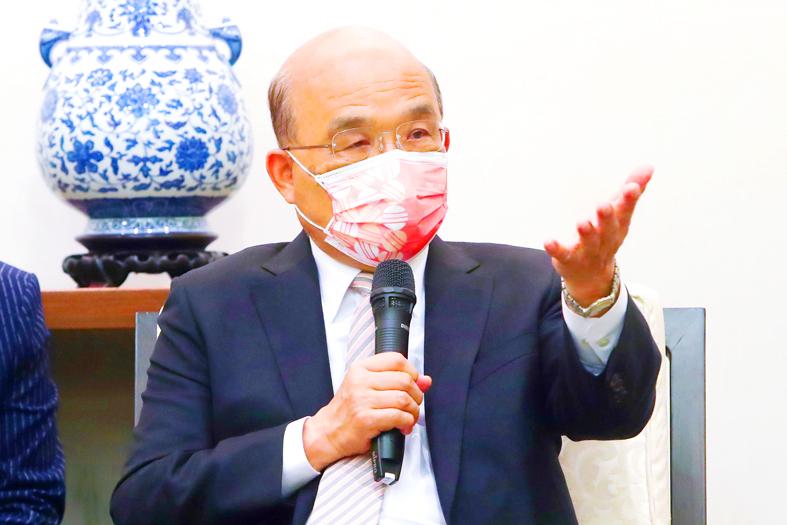China is trying to exert political pressure on Taiwanese companies, Premier Su Tseng-chang (蘇貞昌) said yesterday, criticizing Beijing after it last week fined two Far Eastern Group firms over alleged breaches at factories in China.
However, Far Eastern Group chairman Douglas Hsu (徐旭東) warned against what he said was a prevailing tendency in Taiwan to be critical of anything related to China.
The Chinese leadership has put pressure on Taiwan and tried to use its economic strength to wield political power, Su told reporters before a sports technology meeting in Taipei when asked about the fines.

Photo: CNA
He accused Beijing of being “overbearing,” and having a poor grasp of democracy and diversity.
Far Eastern Group companies Far East New Century and Asia Cement on Monday last week were fined a combined 88.62 million yuan (US$13.89 million) for alleged contraventions of safety and other rules at factories in five Chinese provinces.
China’s Taiwan Affairs Office (TAO) said that the breaches involved environmental, occupational health, land use, plant safety, fire safety and tax issues.
TAO spokesperson Zhu Fenglian (朱鳳蓮) hinted that politics might have been involved in Beijing’s decision to impose the penalties.
China “will absolutely not allow people who support Taiwanese independence or destroy cross-Taiwan Strait relations — who dare bite the hand that feeds them — to make money in the mainland,” Zhu said.
However, in a statement on the TAO’s Web site four days later, Zhu said that the fines were based on Chinese regulations.
She accused the Democratic Progressive Party (DPP) government of politicizing the issue.
The two companies said in separate statements last week that they would pay the fines and other penalties as required, but Hsu on Tuesday offered the first response from the group level.
In a United Daily News letter to the editor, Hsu said that he had long opposed Taiwanese independence and hoped the cross-strait “status quo” would be maintained.
This position is in line with mainstream public opinion in Taiwan, he said.
A poll conducted by the Mainland Affairs Council last month showed that 84.9 percent of 1,072 respondents supported maintaining the “status quo.”
Hsu also expressed concern over what he described as a growing trend in Taiwan toward opposing or criticizing anything China-related.
Taiwanese enterprises that have business operations and investment in China are burdened with a sense of guilt in the political climate in Taiwan, he said, adding that political ideology should be set aside to allow “reasonable understanding and judgements” of the Chinese market.

TRAFFIC SAFETY RULES: A positive result in a drug test would result in a two-year license suspension for the driver and vehicle, and a fine of up to NT$180,000 The Ministry of Transportation and Communications is to authorize police to conduct roadside saliva tests by the end of the year to deter people from driving while under the influence of narcotics, it said yesterday. The ministry last month unveiled a draft of amended regulations governing traffic safety rules and penalties, which included provisions empowering police to conduct mandatory saliva tests on drivers. While currently rules authorize police to use oral fluid testing kits for signs of drug use, they do not establish penalties for noncompliance or operating procedures for officers to follow, the ministry said. The proposed changes to the regulations require

The Executive Yuan yesterday announced that registration for a one-time universal NT$10,000 cash handout to help people in Taiwan survive US tariffs and inflation would start on Nov. 5, with payouts available as early as Nov. 12. Who is eligible for the handout? Registered Taiwanese nationals are eligible, including those born in Taiwan before April 30 next year with a birth certificate. Non-registered nationals with residence permits, foreign permanent residents and foreign spouses of Taiwanese citizens with residence permits also qualify for the handouts. For people who meet the eligibility requirements, but passed away between yesterday and April 30 next year, surviving family members

The German city of Hamburg on Oct. 14 named a bridge “Kaohsiung-Brucke” after the Taiwanese city of Kaohsiung. The footbridge, formerly known as F566, is to the east of the Speicherstadt, the world’s largest warehouse district, and connects the Dar-es-Salaam-Platz to the Brooktorpromenade near the Port of Hamburg on the Elbe River. Timo Fischer, a Free Democratic Party member of the Hamburg-Mitte District Assembly, in May last year proposed the name change with support from members of the Social Democratic Party and the Christian Democratic Union. Kaohsiung and Hamburg in 1999 inked a sister city agreement, but despite more than a quarter-century of

China Airlines Ltd (CAL) yesterday morning joined SkyTeam’s Aviation Challenge for the fourth time, operating a demonstration flight for “net zero carbon emissions” from Taiwan Taoyuan International Airport to Bangkok. The flight used sustainable aviation fuel (SAF) at a ratio of up to 40 percent, the highest proportion CAL has achieved to date, the nation’s largest carrier said. Since April, SAF has become available to Taiwanese international carriers at Taipei International Airport (Songshan airport), Kaohsiung International Airport and Taoyuan airport. In previous challenges, CAL operated “net zero carbon emission flights” to Singapore and Japan. At a ceremony at Taoyuan airport, China Airlines chief sustainability